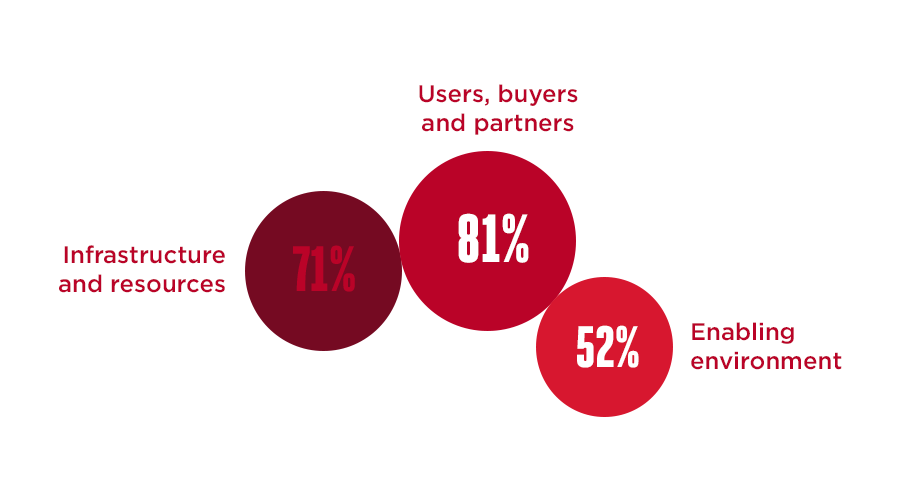Read the first two parts in the scaling blog series, ‘What is scale and how can start-ups achieve it?‘ and ‘The top internal barriers to scale for mobile tech start-ups in LMICs‘.
Start-ups and SMEs in low- and middle-income countries have the potential to reduce inequalities by scaling innovative digital solutions but often lack the capital to do so, as they can be considered too risky for commercial investors. To bridge this gap in funding, the GSMA Innovation Fund offers equity-free grants and technical assistance tailored to the bespoke needs of innovators on their journey to scale.
At the end of their funded projects, the GSMA conducts in-depth surveys with its alumni to understand their scaling progress. In the last of our three-part blog series, we’re reviewing the barriers our alumni currently face as they relate to actors external to the company. In our analysis, we’ve considered three potential external barriers:

For mobile tech solutions, infrastructure and resources are a common barrier in the form of mobile networking connectivity. Alumni report challenges in reaching the most vulnerable people with their products because mobile technology is hard to sell in regions where network connectivity is unreliable or expensive. To cope with this challenge, innovators have taken several approaches. Many aim to partner with mobile network operators to improve connectivity in specific regions or have some of the services made accessible offline. Others focus only on regions where connectivity is not an issue and hope to target more challenging markets later in their journey to scale. However, this remains a barrier for 71% of our alumni portfolio.
Infrastructure and resources can also act as a barrier to scale if start-ups cannot access high-quality inputs. Even small devices like tablets and phones can stall adoption of their services if they are unavailable or prohibitively expensive in certain markets.
This barrier has been so significant for some start-ups that it has led them to pivot their business model. In some cases, there has been no feasible way to onboard users in certain regions to a product as they do not have the connectivity required to use it. In others, users have purchased products but face frequent technical issues due to an unreliable network connection.
Users, buyers, and partners are a critical support for scaling and barriers with these actors create significant hurdles for start-ups. Common issues relate to users in the form of pricing models, unit economics, and generating revenue. For example, in areas with concentrated groups of a social enterprise’s demographic, the potential for new users is high but for revenue is frequently low, as these users often cannot pay full price for products or services. Additionally, many vulnerable communities face a steep learning curve when adopting innovative and new mobile technology. Start-ups are therefore required to invest in training, onboarding, and troubleshooting for new users to ensure they stick with the product. Several alumni have taken advantage of the GSMA’s Mobile Internet Skills Training Toolkit (MISTT), a free resource to teach people the basic skills they need to access and use mobile internet.
Users can also drive product innovation when they push companies to meet demand. Some alumni have reported that their demographic’s demand is for more sophisticated or expensive products than what they offer. This pushes companies to plan for product development in their scaling journey and, while it is a barrier to onboarding users in the short-term, it can ultimately lead to growth by unlocking new users in the long-term.
81% of alumni are experiencing barriers to scale from users, buyers, and partners. To address this, the GSMA has offered technical support on human-centred design, a solution-based approach to problems that puts users at the centre of the process.
The enabling environment may be one of the most challenging external barriers for start-ups to address. It often occurs through overly complex or lacking government regulation related to the social inequalities or environmental issues the start-up is working to address. For example, start-ups working in the recycling industry rely on a wide group of stakeholders including households, businesses, informal workers, and manufacturers to ensure there is significant supply and demand for their product. With support from governments to incentivise recycling, start-ups can focus less on advocacy and more on their business model.
Governments can also change quickly, causing their stance on an issue to take a dramatic shift. From one day to another, start-ups can go from being supported by government policy to operating outside regulation. Just over half of alumni (52%) report that the enabling environment is a current barrier to scale for them. However, more alumni note this could easily become a barrier in the future once they expand internationally. To address it, start-ups need to form partnerships and build relationships with stakeholders that can advocate on their behalf. They also need designated team members that monitor government policy and can stay on top of meeting regulations. For tips on forging successful partnerships with the public sector that leverage digital technology to improve urban utility service delivery in LMICs, see this toolkit developed by our Digital Utilities programme.
Together with the other barriers described in this blog series, it is evident that start-ups in low- and middle-income countries face unique hurdles to growth that require significant resources to address. On their pathway to scale, there is also a critical gap in funding and support needed to de-risk their solutions for follow-on investment. Through grant funding and tailored technical assistance, the GSMA Innovation Fund bridges that gap. By leveraging our unique network within the broader mobile ecosystem, the Innovation Fund is also able to promote and profile these cohorts of alumni to a wide network of potential investors, mobile network operators, and technical partners.
With an approach that emphasises capacity building alongside funding, the GSMA Innovation Fund helps alumni overcome these barriers to scale by fostering partnerships, attracting follow-on investment, and reaching more users.
Visit the GSMA Innovation Fund website for more information!
This initiative is currently funded by UK International Development from the UK government and the Swedish International Development Cooperation Agency (Sida), and is supported by the GSMA and its members.




